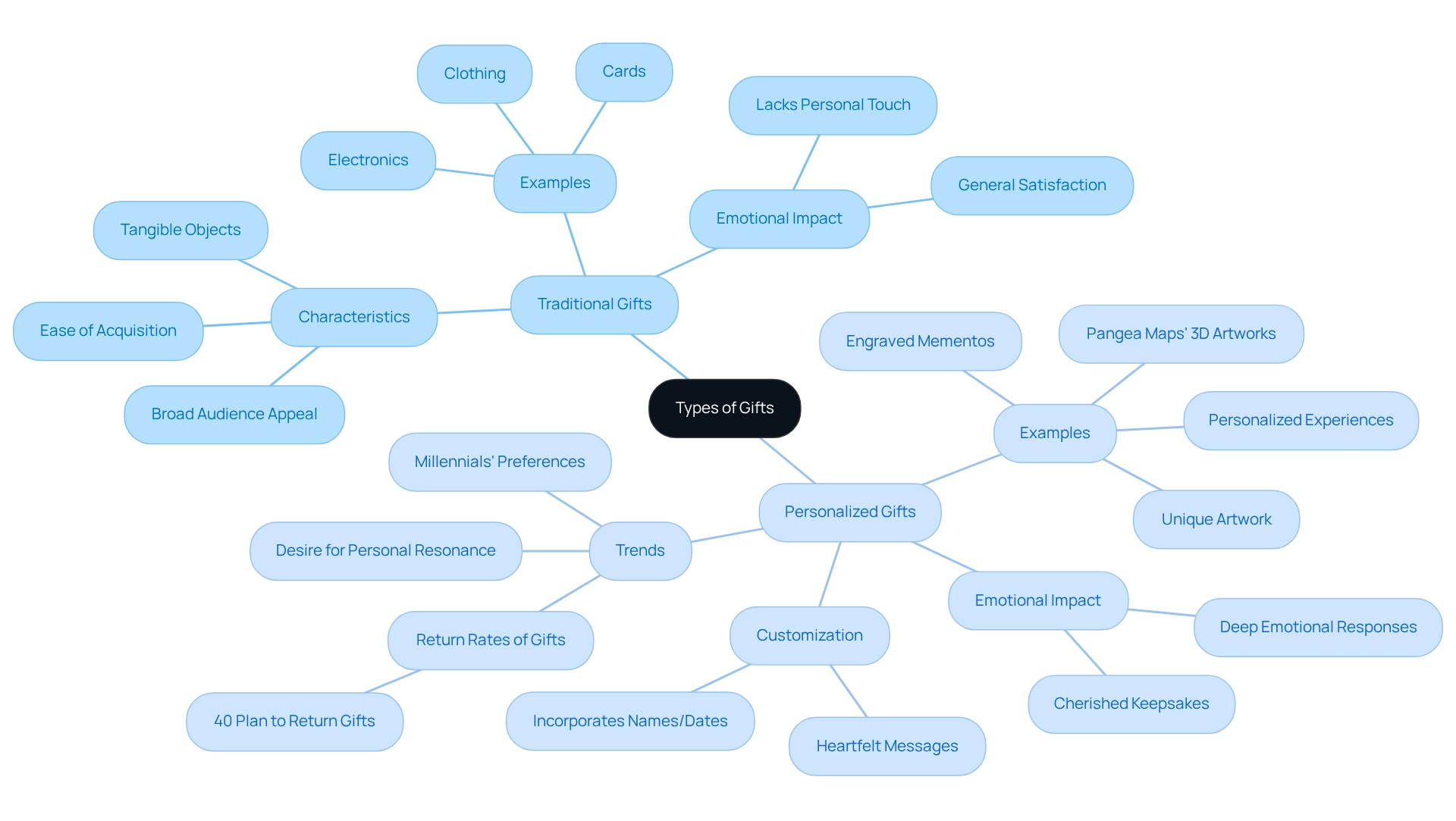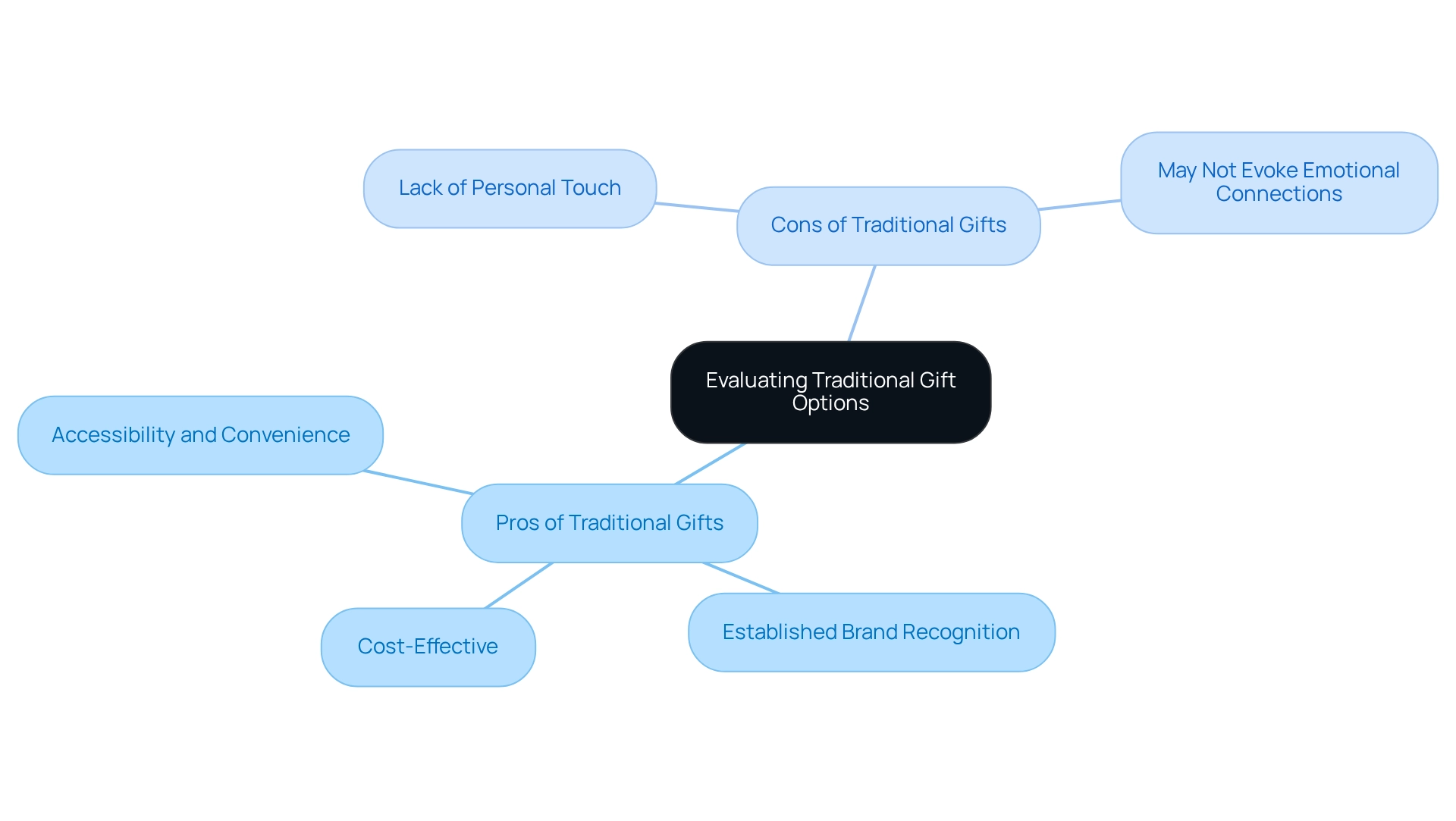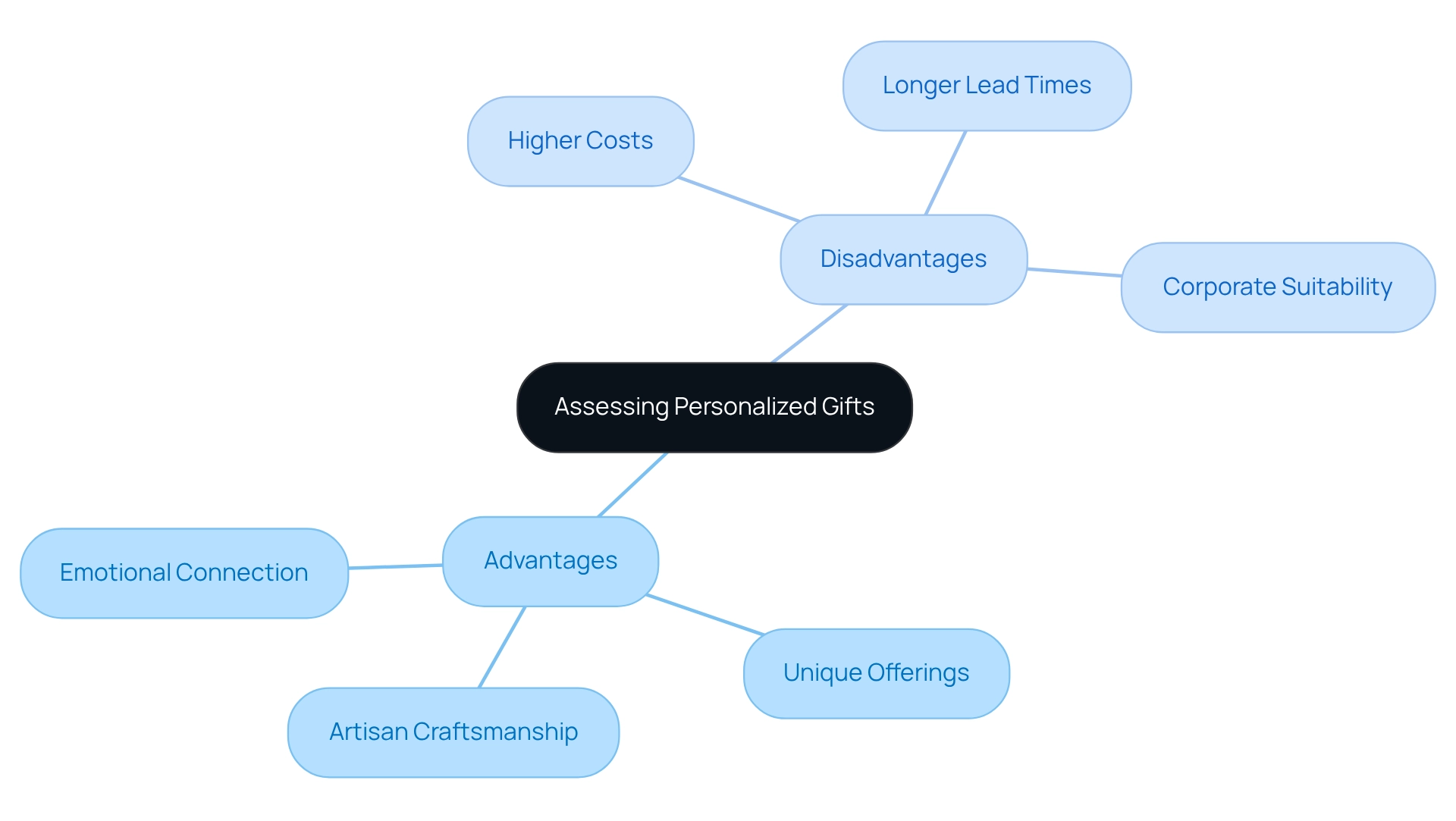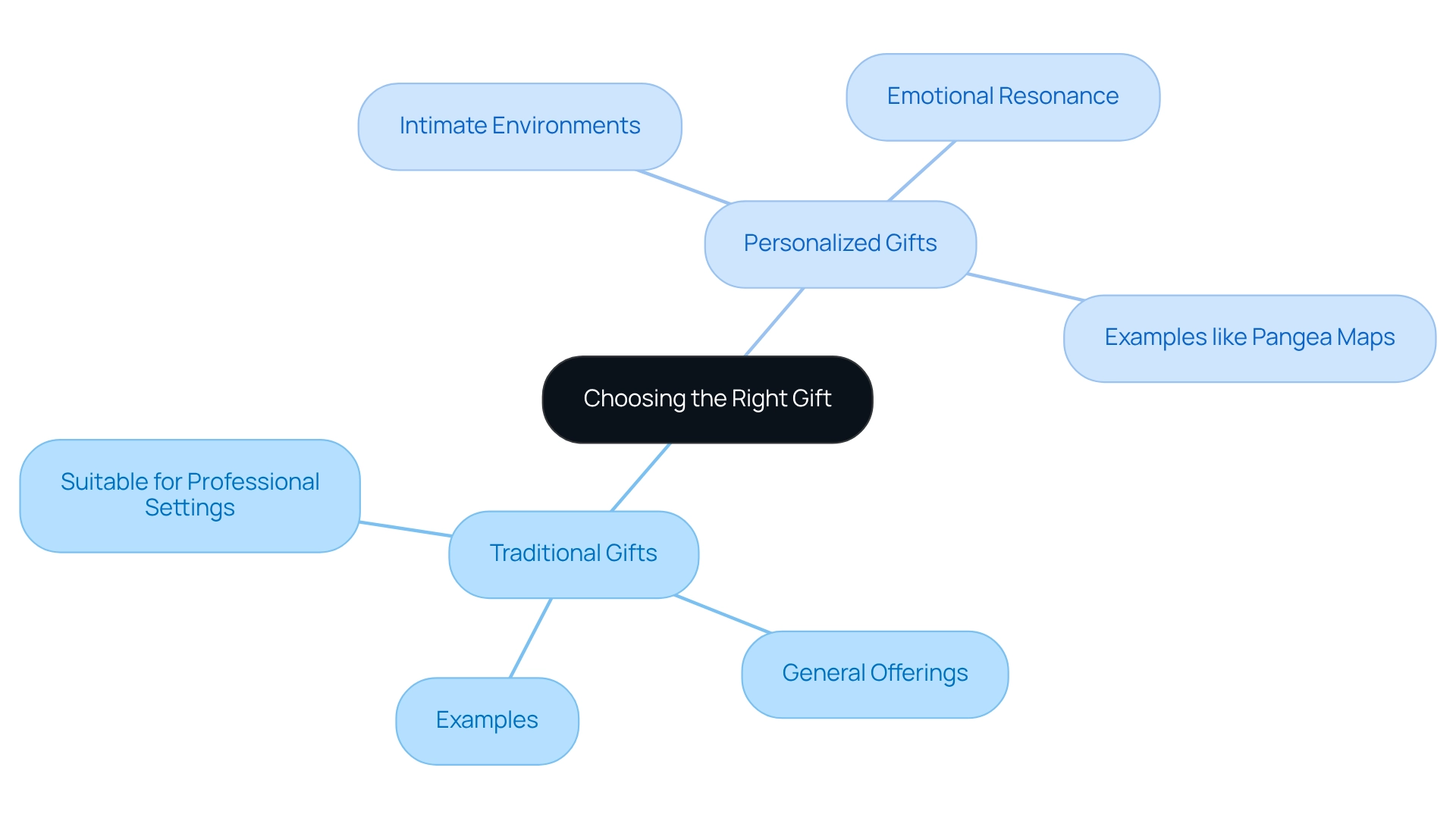Overview
This article presents a compelling comparison between traditional and personalized gift options for 2024, asserting that personalized gifts often evoke deeper emotional connections. In contrast, traditional gifts are recognized for their accessibility and cost-effectiveness. Evidence supports this distinction, revealing a significant consumer preference for gifts that resonate on a personal level. This trend is exemplified by the increasing popularity of customized items that reflect individual relationships and experiences, underscoring the importance of selecting gifts that are not only thoughtful but also tailored to the recipient's unique story.
Introduction
In the realm of gifting, the distinction between traditional and personalized options profoundly influences the recipient's experience. Traditional gifts, known for their universal appeal and convenience, fulfill their purpose admirably across various occasions. Yet, they often fall short in delivering the emotional resonance that personalized gifts can offer. Conversely, personalized gifts elevate a simple token into a treasured keepsake, showcasing the giver's thoughtfulness and the unique connection shared with the recipient.
As the movement towards customization gains momentum, grasping the subtleties between these two gifting styles becomes crucial, particularly in both personal and corporate spheres. This exploration investigates the benefits and drawbacks of each approach, guiding readers toward making deliberate gifting choices that resonate more deeply.
Defining Traditional and Personalized Gifts
Conventional offerings, such as gifts 2024, are typically tangible objects that attract a broad audience, often selected based on current trends or shared preferences. Common examples include clothing, electronics, and cards, favored for their widespread appeal and ease of acquisition. While these gifts serve their purpose effectively for various occasions, they often lack a personal touch.
In contrast, personalized presents are uniquely crafted for the recipient, incorporating specific elements such as names, dates, or heartfelt messages. This customization transforms the gift from a mere object into a significant token of thoughtfulness, frequently evoking deep emotional responses. Customized presents can take many forms, including unique artwork, engraved mementos, or personalized experiences, making them particularly unforgettable for important milestones.
One exceptional choice in the realm of tailored presents is Pangea Maps' handcrafted 3D artworks. Each map is meticulously designed using premium environmental materials, such as the highest grade 1.5mm birch ply, and features hand sketches over bathymetry charts. The custom designs require about an hour to create and are hand-glued and framed locally, ensuring a high level of craftsmanship. This artisanal approach not only guarantees quality but also facilitates unique storytelling, as each map can be customized to reflect the recipient's cherished memories and adventures. The maps arrive framed and ready for display, making them a considerate and visually impressive gift.
The increasing trend towards personalized gifts 2024 is underscored by statistics indicating that a significant segment of buyers, particularly millennials, prioritize reviews and cost when selecting gifts 2024. In reality, many individuals express a desire for gifts 2024 that resonate on a personal level, as shown by the fact that around 40% of shoppers intend to return at least one item received during the holiday season. This underscores the importance of thoughtful gifting, as people increasingly seek items that mirror their unique relationships and experiences.
The emotional impact of customized presents often surpasses that of conventional choices, as they are crafted to honor unique narratives and valued recollections. Case studies reveal that recipients frequently experience joy and appreciation upon receiving a personalized item, reinforcing the notion that these gifts are not merely offerings but cherished keepsakes that foster deeper connections.

Evaluating Traditional Gift Options: Pros and Cons
The benefits of conventional presents stem from their availability and ease, rendering them perfect for last-minute acquisitions. Their established brand recognition often enhances perceived value, which can be particularly beneficial in a corporate gifting context. Furthermore, conventional presents tend to be more economical, especially when purchased in large quantities, with shops usually experiencing profit margins of about 40%. However, the drawbacks are significant. Conventional presents often lack a personal touch, making them generic and possibly impersonal. While recipients may value the sentiment behind such offerings, they often do not inspire the emotional bond that tailored alternatives can deliver. Moreover, conventional offerings may not accommodate the specific tastes or preferences of the recipient, which can result in dissatisfaction.
Pros of Traditional Gifts:
- Accessibility and convenience for last-minute purchases.
- Established brand recognition enhances perceived value.
- Cost-effective, especially when bought in bulk.
Cons of Traditional Gifts:
- Often lack a personal touch, making them generic.
- May not evoke emotional connections or cater to individual preferences.
Insights from corporate experts highlight the significance of considerate and customized presents, indicating that a more tailored strategy can improve employee satisfaction and cultivate a positive brand image. Businesses adopting tailored present strategies, such as those provided by Pangea Maps, experience enhanced engagement and loyalty, aligning with contemporary consumer expectations. Each map from Pangea Maps is meticulously hand-sketched over bathymetry charts, taking about an hour to design, and is hand-glued and framed locally, creating a unique piece that tells a story and celebrates cherished memories. Moreover, around 40% of individuals typically experience pressure when presenting items, emphasizing the emotional intricacies associated with customary exchanges. As the market for customized presents continues to expand, fueled by improvements in AI that enhance personalized suggestions, the distinction between conventional and personalized items becomes increasingly significant for corporate gifting managers.

Assessing Personalized Gifts: Advantages and Disadvantages
Customized presents offer a unique advantage by fostering a profound emotional connection between the giver and the recipient. This personalization transforms a simple gift into a cherished memento, showcasing the giver's thoughtfulness and effort. In a market saturated with standard options, custom items stand out, often eliciting more intense emotional responses and leaving enduring impressions. For example, Pangea Maps delivers handcrafted 3D maps made from premium 1.5mm birch ply, finished with white acrylic, exemplifying artisan craftsmanship and sustainable materials. Each map is meticulously crafted, featuring hand-drawn illustrations over bathymetry, capturing significant stories and adventures, making them an ideal personalized gift that resonates on a personal level.
Nevertheless, there are significant drawbacks to consider, particularly in corporate settings. The costs associated with customized items can exceed those of conventional alternatives, potentially posing financial challenges. Additionally, the production lead times may be extended, making them less suitable for last-minute gifting scenarios. In professional contexts, the appropriateness of customized gifts can also be questioned; traditional offerings may be more suitable for specific occasions, ensuring broader appeal and acceptance.
Despite these obstacles, the inclination towards customized gifts in 2024 continues to rise, with 58% of consumers planning to spend at least $500 on such gifts this year. This trend underscores the growing preference for thoughtful, personalized options that resonate on a deeper level. As companies navigate the complexities of corporate gifting, understanding the emotional benefits and potential drawbacks of customized items, like those from Pangea Maps, will be crucial in cultivating meaningful connections with clients and employees alike.

Choosing the Right Gift: Traditional vs. Personalized
When choosing between conventional and custom gifts, it is essential to consider the occasion, the recipient's preferences, and your relationship with them. Conventional gifts often suit professional settings or casual acquaintances, where a general offering suffices. In contrast, custom items, such as the artisanal handcrafted 3D maps by Pangea Maps, truly excel in intimate environments—birthdays, anniversaries, or significant milestones—where emotional resonance is crucial. These custom designs encapsulate significant stories and memories, crafted over bathymetry charts and framed locally, making them a unique and meaningful choice. As Mwanandeke Kindembo aptly stated, "The greatest present you can offer to anyone is the one you would like to retain for yourself," underscoring the importance of thoughtful giving.
Moreover, consider the timing of your purchase; if you have ample time, a customized item like a Pangea Map can be a considerate option, while conventional gifts may be more appropriate for last-minute situations. Research indicates that gifts incorporating personal elements leave a lasting impact, creating memories that extend beyond the physical object, thereby reinforcing the significance of the bond shared between individuals. Ultimately, the best gift reflects the giver's understanding of the recipient's tastes and the context of the occasion.
Incorporating these insights into your gifting strategy can elevate the experience for both you and the recipient, ensuring that the gesture is not only appreciated but also cherished.

Conclusion
The exploration of traditional versus personalized gifts unveils distinct advantages and disadvantages intrinsic to each approach. Traditional gifts, while convenient and accessible, often lack the emotional depth and personal connection that personalized gifts provide. They fulfill their purpose effectively, particularly in corporate and casual settings, yet may leave recipients longing for a more meaningful gesture. In contrast, personalized gifts, exemplified by the handcrafted 3D maps from Pangea Maps, elevate the gifting experience by showcasing thoughtfulness and a unique connection. These gifts resonate on a personal level, transforming simple tokens into treasured keepsakes.
As the trend toward customization continues to rise, grasping the nuances between these gifting styles becomes essential. Personalized gifts evoke stronger emotional responses and foster deeper connections, rendering them particularly suitable for significant milestones and intimate occasions. However, it is crucial to consider potential drawbacks, such as higher costs and longer lead times, especially in corporate contexts.
Ultimately, the choice between traditional and personalized gifts hinges on the occasion, the recipient's preferences, and the relationship shared. By prioritizing thoughtful gifting—whether through traditional or personalized means—individuals can create lasting memories and strengthen connections. Recognizing the significance of the relationship and the emotional impact of each gift can lead to more deliberate and meaningful gifting choices that resonate deeply with recipients.
Frequently Asked Questions
What are traditional gifts?
Traditional gifts, often referred to as conventional offerings, are tangible objects selected based on current trends or shared preferences. Common examples include clothing, electronics, and cards, which are favored for their broad appeal and ease of acquisition.
How do personalized gifts differ from traditional gifts?
Personalized gifts are uniquely crafted for the recipient, incorporating specific elements such as names, dates, or heartfelt messages. This customization transforms the gift into a significant token of thoughtfulness, often evoking deep emotional responses, unlike traditional gifts which may lack a personal touch.
What are some examples of personalized gifts?
Examples of personalized gifts include unique artwork, engraved mementos, and personalized experiences. These gifts are designed to be memorable and often celebrate important milestones in the recipient's life.
What is a notable example of a personalized gift mentioned in the article?
A notable example is Pangea Maps' handcrafted 3D artworks, which are meticulously designed using premium materials and can be customized to reflect the recipient's cherished memories and adventures.
What materials are used in Pangea Maps' products?
Pangea Maps uses high-grade 1.5mm birch ply and incorporates hand sketches over bathymetry charts in their handcrafted 3D artworks.
Why is the trend towards personalized gifts increasing?
The trend towards personalized gifts is increasing because many buyers, particularly millennials, prioritize gifts that resonate on a personal level. Statistics indicate that around 40% of shoppers intend to return at least one item received during the holiday season, highlighting the importance of thoughtful gifting.
What emotional impact do personalized gifts have on recipients?
Personalized gifts often evoke joy and appreciation from recipients, reinforcing the idea that these gifts are cherished keepsakes that foster deeper connections and honor unique narratives and valued recollections.



